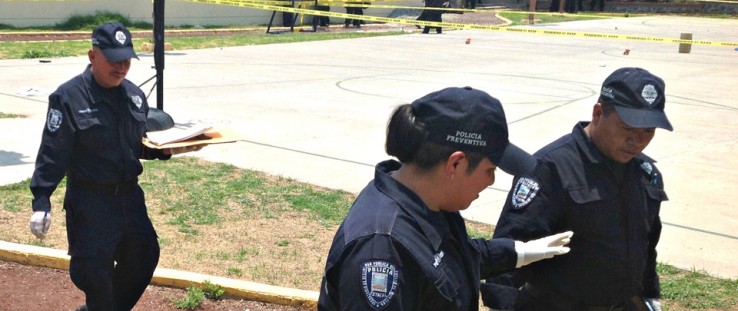 In the city of Cuernavaca, police officers participate in a field exercise to preserve and protect crime scenes, which includes looking for clues, chain of custody and principles of forensic investigations.
USAID Justice and Security Program
In the city of Cuernavaca, police officers participate in a field exercise to preserve and protect crime scenes, which includes looking for clues, chain of custody and principles of forensic investigations.
USAID Justice and Security Program
 In the city of Cuernavaca, police officers participate in a field exercise to preserve and protect crime scenes, which includes looking for clues, chain of custody and principles of forensic investigations.
USAID Justice and Security Program
In the city of Cuernavaca, police officers participate in a field exercise to preserve and protect crime scenes, which includes looking for clues, chain of custody and principles of forensic investigations.
USAID Justice and Security Program
Mexicali police and prosecutors felt they had reason to be proud when they brought Pedro Ramos before a judge on suspicion of armed robbery and rape. They knew they had pulled off a meticulous operation with exceptional speed and efficiency.
"This arrest was possible because of very tight collaboration between municipal police, investigative police and prosecutors," said María Coronado, a prosecutor at the Sexual Crimes Unit in Mexicali. "It was made possible by changes in the system."
The prior procedural system included many bureaucratic steps, which made compiling evidence and finding a suspect cumbersome. The improvements to Mexicali’s law enforcement are due to Mexico's landmark criminal justice reform of 2008, which increases the responsibilities of the police and empowers them to not only prevent crime, but to investigate and assist prosecutors in building cases. Mexico's constitution calls for the reform to be implemented nationwide by 2016.
USAID is playing a critical role in helping to implement these reforms, including helping to develop protocols to delegate tasks and improve communication between police and prosecutors. Since the protocols went into effect in September 2012 in Mexicali's Sexual Crimes Unit, police participation in investigations has doubled, and the number of investigations completed successfully has increased more than 140 percent.
"Better coordination between police and prosecutors has made a huge difference," said Rosa Mendoza, the police coordinator at the Sexual Crimes Unit. "Because of the protocols developed with USAID, we are now able to minimize the time we spend apprehending a suspect. Police and prosecutors have gotten to know each other, trust each other, and stand shoulder to shoulder. That has given the police much more confidence and motivation to take the initiative."
One of the most important aspects of the new protocol defines the role of the police after a crime. Municipal police, who previously did little more than cordon off the crime scene, now immediately start identifying evidence, gathering names and interviewing witnesses, and ensuring the safety of public officials and civilians in the case of a bomb threat or other danger. Investigative police, who once had to wait for orders from prosecutors, now act immediately when they arrive onsite. They thoroughly interview witnesses, analyze evidence and call in experts in ballistics, fingerprinting and chemical forensics.
Police say that the speed of the new system allows them to collect evidence that might otherwise have disappeared under the old system. Meanwhile, police and prosecutors, who rarely worked side by side in the past, are now encouraged to meet every day. They are in constant contact as investigations unfold.
"There are only a few steps between the offices of the police and prosecutors here at the Sexual Crimes Unit. But that distance was once an abyss," said Mendoza. "Now we work together, apprehend suspects more quickly, and obtain evidence that stands up in court."
That is what happened in November 2012 in the Ramos case. Police received a call on the emergency hotline informing them that a well-known ice cream shop had been held up, and its hostess raped at knife-point. As prosecutors debriefed the traumatized woman back at headquarters and helped her through medical exams and psychological counseling, police were at the scene interviewing witnesses and performing forensic analysis on the weapon and the DNA in the bathroom where the rape occurred.
As soon as prosecutors obtained the assailant’s description, they called the police, who used that information to comb arrest records of suspects matching the description. By 6:30 that evening, the team had arrested Ramos—a vagrant dressed in old, filthy clothes who had been arrested previously on charges of public harassment, assault and possession of a deadly weapon. The suspect, currently in jail, awaits trial and faces a sentence of up to nine years in prison.
Under the old system, Ramos might easily have fled the city before he could be apprehended. Delays in collecting and securing physical samples on-site might also have comprised the case, allowing evidence to disappear or decay.
USAID's work in this area is part of the Justice and Security Program that began in 2009. The program provides advice on the development of new criminal justice legislation, trains justice system actors on their roles in the new system, and works with civil society organizations to foster criminal justice reform.
This article originally appeared in Transforming Lives in July 2013
Related Articles









Comment
Make a general inquiry or suggest an improvement.